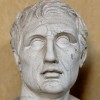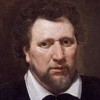You are astonished to find yourself the butt of so much calumny, opposition, indifference and ill-will. You will be more so and have more of it; it is the reward of the good and the beautiful: one may calculate the value of a man from the number of his critics and the importance of a work by the evil said of it.
Quotations about:
calumny
Note not all quotations have been tagged, so Search may find additional quotes on this topic.
As President of our country and Commander-in-Chief of our military, I accept that people are going to call me awful things every day, and I will always defend their right to do so.
Barack Obama (b. 1961) American politician, US President (2009-2017)
Speech, United Nations (25 Sep 2012)
(Source)
If a man has reported to you that a certain person speaks ill of you, do not make any defense to what has been told you: but reply, The man did not know the rest of my faults, for he would not have mentioned these only.
Epictetus (c.55-c.135) Greek (Phrygian) Stoic philosopher
Enchiridion, 33 (c. AD 135) [tr. Long (1888)]
(Source)
Alt. trans.: "If anyone tells you that a certain person speaks ill of you, do not make excuses about what is said of you, but answer, 'He was ignorant of my other faults, else he would have not mentioned these alone.'" [tr. Higginson (1948)]
BENEDICK: She speaks poniards and every word stabs.
William Shakespeare (1564-1616) English dramatist and poet
Much Ado About Nothing, Act 2, sc. 1, l. 244 (2.1.244) (1598)
(Source)
Even doubtful Accusations leave a Stain behind them.
Thomas Fuller (1654-1734) English physician, preacher, aphorist, writer
Gnomologia: Adages and Proverbs, #1395 (1732)
(Source)
The tongue is not steele, yet it cuts.
George Herbert (1593-1633) Welsh priest, orator, poet.
Jacula Prudentum, or Outlandish Proverbs, Sentences, &c. (compiler), # 838 (1640 ed.)
(Source)
I never yet heard man or woman much abused, that I was not inclined to think the better of them; and to transfer any suspicion or dislike to the person who appeared to take delight in pointing out the defects of a fellow-creature.
Jane Porter (1776-1850) English historical novelist and dramatist
Aphorisms of Sir Philip Sidney, Vol. 2, “Falsehood, Treachery, and Slander,” #19, Remark (1807)
(Source)
I will not deny but that the best apology against false accusers is silence and sufferance, and honest deeds set against dishonest words.
Every life is its own excuse for being, and to deny or refute the untrue things that are said of you is an error in judgment. All wrong recoils upon the doer, and the man who makes wrong statements about others is himself to be pitied, not the man he vilifies. It is better to be lied about than to lie. At the last no one can harm us but ourselves.
Elbert Hubbard (1856-1915) American writer, businessman, philosopher
The Roycroft Dictionary and Book of Epigrams (1923)
(Source)
Calumny is a monstrous vice: for, where parties indulge in it, there are always two that are actively engaged in doing wrong, and one who is subject to injury. The calumniator inflicts wrong by slandering the absent; he who gives credit to the calumny, before he has investigated the truth, is equally implicated. The person traduced is doubly injured — first by him who propagates, and secondly by him who credits the calumny.
Like the tiger, that seldom desists from pursuing man after having once preyed upon human flesh, the reader, who has once gratified his appetite with calumny, makes ever after, the most agreeable feast upon murdered reputation.
Never complain and never explain.
Benjamin Disraeli (1804-1881) English politician and author
(Attributed)
(Source)
Most often cited to John Morley, Life of William Ewart Gladstone, Vol. 1, Book 2, ch. 2, sec. 1 (1903). This was Disraeli's distillation of advice that Lord High Chancellor John Copley, Lord Lyndhurst, gave at a January 1835 dinner attended both a young Gladstone and Disraeli:
Never defend yourself before a popular assemblage, except with and by retorting the attack; the hearers, in the pleasure which the assault gives them, will forget the previous charge.
The phrase is also attributed to Benjamin Jowett, Henry Ford II, and Charles Stewart Parnell.
What Paul says about Peter tells us more about Paul than it does about Peter.
Baruch Spinoza (1632-1677) Dutch philosopher
(Attributed)
(Source)
Quoted by Erich Fromm, Psychoanalysis and Religion, 3 (1950).
Calumny is like a wasp which harasses you. Raise no hand against it unless you’re sure of killing it, for otherwise it will return to the charge more furious than ever.
[La calomnie est comme la guêpe qui vous importune, et contre laquelle il ne faut faire aucun mouvement, à moins qu’on ne soit sûr de la tuer, sans quoi elle revient à la charge, plus furieuse que jamais.]
Nicolas Chamfort (1741-1794) French writer, epigrammist (b. Nicolas-Sébastien Roch)
Products of Perfected Civilization [Produits de la Civilisation Perfectionée], Part 1 “Maxims and Thoughts [Maximes et Pensées],” ch. 5, ¶ 302 (1795) [tr. Dusinberre (1992)]
(Source)
(Source (French)). Alternate translations:
Calumny is like the wasp which worries you, which it were best not to try to get rid of unless you are sure of slaying it; for otherwise it will return to the charge more furious than ever.
[Source (1872)]
Scandal is an importunate wasp, against which we must make no movement unless we are quite sure that we can kill it; otherwise it will return to the attack more furious than ever.
[tr. Mathers (1926)]
Calumny is like some annoying wasp, against which one must make no move unless one is sure of killing it, or else it will return to the charge more furiously than ever.
[tr. Merwin (1969)]
Calumny is a wasp that bothers you, and against which you mustn't make any movement unless you are sure to kill it; otherwise it will attack you more furiously than before.
[tr. Siniscalchi (1994)]
Slander is like a wasp which is pestering you but which you mustn't take any action against unless he happens to turn round.
[tr. Parmée (2003), ¶ 182]
To avoid dissensions we should ever be on our guard, more especially with those who drive us to argue with them, with those who vex and irritate us, and who say things likely to excite us to anger. When we find ourselves in company with quarrelsome, eccentric individuals, people who openly and unblushingly say the most shocking things, difficult to put up with, we should take refuge in silence, and the wisest plan is not to reply to people whose behavior is so preposterous.
Those who insult us and treat us contumeliously are anxious for a spiteful and sarcastic reply: the silence we then affect disheartens them, and they cannot avoid showing their vexation; they do all they can to provoke us and to elicit a reply, but the best way to baffle them is to say nothing, refuse to argue with them, and to leave them to chew the cud of their hasty anger. This method of bringing down their pride disarms them, and shows them plainly that we slight and despise them.
Besides, there are two things that will be believed of any man whatsoever, and one of them is that he has taken to drink.
He that flings Dirt at another dirtieth himself most.
Thomas Fuller (1654-1734) English physician, preacher, aphorist, writer
Gnomologia: Adages and Proverbs, #2107 (1732)
(Source)
Every whisper of infamy is industriously circulated, every hint of suspicion eagerly improved, and every failure of conduct joyfully published by those whose interest it is that the eye and voice of the public should be employed on any rather than themselves.
Samuel Johnson (1709-1784) English writer, lexicographer, critic
The Rambler, #76 (8 Dec 1750)
(Source)
Sir, calumnies are answer’d best with silence.
OSWALD: Why dost thou use me thus? I know thee not.
KENT: Fellow, I know thee.
OSWALD: What dost thou know me for?
KENT: A knave; a rascal; an eater of broken meats; a base, proud, shallow, beggarly, three-suited, hundred-pound, filthy, worsted-stocking knave; a lily-livered, action-taking whoreson, glass-gazing, superserviceable, finical rogue; one-trunk-inheriting slave; one that wouldst be a bawd, in way of good service, and art nothing but the composition of a knave, beggar, coward, pander, and the son and heir of a mongrel bitch: one whom I will beat into clamorous whining, if thou deniest the least syllable of thy addition.
William Shakespeare (1564-1616) English dramatist and poet
King Lear, Act 2, sc. 2, l. 11ff (2.2.11-24) (1606)
(Source)
HAMLET: Be thou as chaste as ice, as pure as snow, thou shalt not escape calumny.
William Shakespeare (1564-1616) English dramatist and poet
Hamlet, Act 3, sc. 1, l. 147ff (3.1.147-148) (c. 1600)
(Source)
The widespread interest in gossip is inspired, not by a love of knowledge, but by malice: no one gossips about other people’s secret virtues, but only about their secret vices. Accordingly most gossip is untrue, but care is taken not to verify it. Our neighbour’s sins, like the consolations of religion, are so agreeable that we do not stop to scrutinize the evidence closely.
Bertrand Russell (1872-1970) English mathematician and philosopher
“The Aims of Education” (1929)
(Source)
Usually shortened to "No one gossips about other people's secret virtues."





























